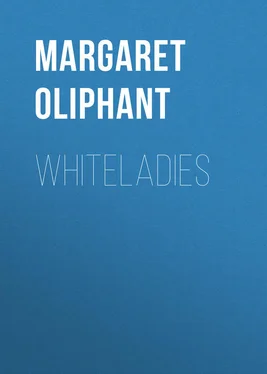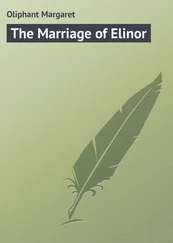Margaret Oliphant - Whiteladies
Здесь есть возможность читать онлайн «Margaret Oliphant - Whiteladies» — ознакомительный отрывок электронной книги совершенно бесплатно, а после прочтения отрывка купить полную версию. В некоторых случаях можно слушать аудио, скачать через торрент в формате fb2 и присутствует краткое содержание. ISBN: , Жанр: foreign_prose, на английском языке. Описание произведения, (предисловие) а так же отзывы посетителей доступны на портале библиотеки ЛибКат.
- Название:Whiteladies
- Автор:
- Жанр:
- Год:неизвестен
- ISBN:http://www.gutenberg.org/ebooks/52388
- Рейтинг книги:5 / 5. Голосов: 1
-
Избранное:Добавить в избранное
- Отзывы:
-
Ваша оценка:
- 100
- 1
- 2
- 3
- 4
- 5
Whiteladies: краткое содержание, описание и аннотация
Предлагаем к чтению аннотацию, описание, краткое содержание или предисловие (зависит от того, что написал сам автор книги «Whiteladies»). Если вы не нашли необходимую информацию о книге — напишите в комментариях, мы постараемся отыскать её.
Whiteladies — читать онлайн ознакомительный отрывок
Ниже представлен текст книги, разбитый по страницам. Система сохранения места последней прочитанной страницы, позволяет с удобством читать онлайн бесплатно книгу «Whiteladies», без необходимости каждый раз заново искать на чём Вы остановились. Поставьте закладку, и сможете в любой момент перейти на страницу, на которой закончили чтение.
Интервал:
Закладка:
How pleasant it was out there in the porch! the branches of the lime-trees blown about softly by the wind; a daisy here and there lifting its roguish saucy head, which somehow had escaped the scythe, from the close-mown lawn; the long garlands of roses playing about the stone mullions of the window, curling round the carved lintel of the door; the cool passage on the other side leading into the house, with its red floor and carved doors, and long range of casement. Miss Susan scarcely lifted her eyes from her knitting, but every detail of the peaceful scene was visible before her. No wonder – she had learned them all by heart in the long progress of the years. She knew every twig on the limes, every bud on the roses. She sat still, scarcely moving, knitting in with her thread many an anxious thought, many a wandering fancy, but with a face serene enough, and all about her still. It had never been her habit to betray what was in her to an unappreciative world.
She brightened up a little, however, and raised her head, when she heard the distant sound of a whistle coming far off through the melodious Summer air. It caught her attention, and she raised her head for a second, and a smile came over her face. “It must be Everard,” she said to herself, and listened, and made certain, as the air, a pretty gay French air, became more distinct. No one else would whistle that tune. It was one of Reine’s French songs – one of those graceful little melodies which are so easy to catch and so effective. Miss Susan was pleased that he should whistle one of Reine’s tunes. She had her plans and theories on this point, as may be hereafter shown; and Everard besides was a favorite of her own, independent of Reine. Her countenance relaxed, her knitting felt lighter in her hand, as the whistle came nearer, and then the sound of a firm, light step. Miss Susan let the smile dwell upon her face, not dismissing it, and knitted on, expecting calmly till he should make his appearance. He had come to make his report to her of another journey, from which he had just returned, in search of the lost Austins. It had not been at all to his own interest to pursue this search, for, failing Mr. Farrel-Austin, he himself would be the heir-at-law; but Everard, as Miss Susan had often said to herself, was not the sort of person to think of his own advantage. He was, if anything, too easy on that head – too careless of what happened to himself individually. He was an orphan with a small income – that “just enough” which is so fatal an inheritance for a young man – nominally at “the Bar,” actually nowhere in the race of life, but very ready to do anything for anybody, and specially for his old cousins, who had been good to him in his youth. He had a small house of his own on the river not far off, which the foolish young man lived in only a few weeks now and then, but which he refused to let, for no reason but because it had been his mother’s, and her memory (he thought) inhabited the place. Miss Susan was so provoked with this and other follies that she could have beaten Everard often, and then hugged him – a mingling of feelings not unusual. But as Everard is just about to appear in his own person, I need not describe him further. His whistle came along, advancing through the air, the pleasantest prelude to his appearance. Something gay and free and sweet was in the sound, the unconscious self-accompaniment of a light heart. He whistled as he went for want of thought – nay, not for want of thought, but because all the movements of his young soul were as yet harmonious, lightsome, full of hope and sweetness; his gay personality required expression; he was too light-hearted, too much at home in the world, and friendly, to come silent along the sunshiny way. So, as he could not talk to the trees and the air, like a poetical hero in a tragedy, Everard made known his good-will to everything, and delicious, passive happiness, by his whistle; and he whistled like a lark, clear and sweet; it was one of his accomplishments. He whistled Miss Susan’s old airs when she played them on her old piano, in charming time and harmony; and he did not save his breath for drawing-room performances, but sent before him these pleasant intimations of his coming, as far as a mile off. To which Miss Susan sat and listened, waiting for his arrival, with a smile on her face.
CHAPTER II
“I HAVE been waiting for you these fifteen minutes,” she said.
“What – you knew I was coming?”
“I heard you, boy. If you choose to whistle ‘ Ce que je desire ’ through St. Austin’s parish, you may make up your mind to be recognized. Ah! you make me think of my poor children, the one dying, the other nursing him – ”
“Don’t!” said the young man, holding up his hand, “it is heart-breaking; I dare not think of them, for my part. Aunt Susan, the missing Austins are not to be found in Cornwall. I went to Bude, as you told me, and found a respectable grocer, who came from Berks, to be sure, and knew very little about his grandfather, but is not our man. I traced him back to Flitton, where he comes from, and found out his pedigree. I have broken down entirely. Did you know that the Farrel-Austins were at it too?”
“At what?”
“This search after our missing kinsfolk. They have just come back, and they look very important; I don’t know if they have found out anything.”
“Then you have been visiting them?” said Miss Susan, bending her head over her knitting, with a scarcely audible sigh; it would have been inaudible to a stranger, but Everard knew what it meant.
“I called – to ask if they had got back, that was all,” he said, with a slight movement of impatience; “and they have come back. They had come down the Rhine and by the old Belgian towns, and were full of pictures, and cathedrals, and so forth. But I thought I caught a gleam in old Farrel’s eye.”
“I wonder – but if he had found them out I don’t think there would be much of a gleam in his eye,” said Miss Susan. “Everard, my dear, if we have to give up the house to them, what shall I do? and my poor Austine will feel it still more.”
“If it has to be done, it must be done, I suppose,” said Everard, with a shrug of his shoulders, “but we need not think of it until we are obliged; and besides, Aunt Susan, forgive me, if you had to give it up to – poor Herbert himself, you would feel it; and if he should get better, poor fellow, and live, and marry – ”
“Ah, my poor boy,” said Miss Susan, “life and marriage are not for him!” She paused a moment and dried her eyes, and gulped down a sob in her throat. “But you may be right,” she said in a low tone, “perhaps, whoever our successors were, we should feel it – even you, Everard.”
“You should never go out of Whiteladies for me,” said the young man, “ that you may be sure of; but I shall not have the chance. Farrel-Austin, for the sake of spiting the family generally, will make a point of outliving us all. There is this good in it, however,” he added, with a slight movement of his head, which looked like throwing off a disagreeable impression, and a laugh, “if poor Herbert, or I, supposing such a thing possible, had taken possession, it might have troubled your affection for us, Aunt Susan. Nay, don’t shake your head. In spite of yourself it would have affected you. You would have felt it bitter, unnatural, that the boys you had brought up and fostered should take your house from you. You would have struggled against the feeling, but you could not have helped it, I know.”
“Yes; a great deal you know about an old woman’s feelings,” said Miss Susan with a smile.
“And as for these unknown people, who never heard of Whiteladies, perhaps, and might pull down the old house, or play tricks with it – for instance, your grocer at Bude, the best of men, with a charming respectable family, a pretty daughter, who is a dress-maker, and a son who has charge of the cheese and butter. After all, Aunt Susan, you could not in your heart prefer them even to old Farrel-Austin, who is a gentleman at least, and knows the value of the old house.”
Читать дальшеИнтервал:
Закладка:
Похожие книги на «Whiteladies»
Представляем Вашему вниманию похожие книги на «Whiteladies» списком для выбора. Мы отобрали схожую по названию и смыслу литературу в надежде предоставить читателям больше вариантов отыскать новые, интересные, ещё непрочитанные произведения.
Обсуждение, отзывы о книге «Whiteladies» и просто собственные мнения читателей. Оставьте ваши комментарии, напишите, что Вы думаете о произведении, его смысле или главных героях. Укажите что конкретно понравилось, а что нет, и почему Вы так считаете.












